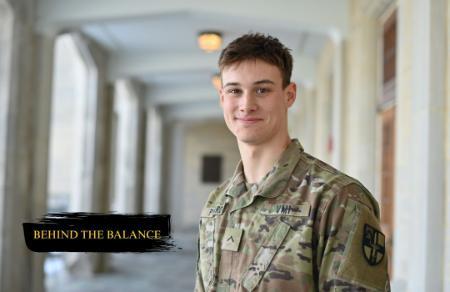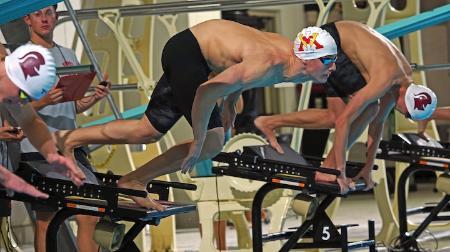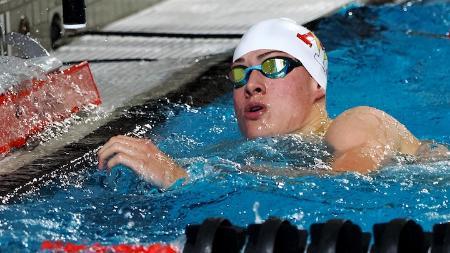Behind the Balance: Matthew Picard ’27 — Keydet Men’s Swim and Dive
Virginia Military Institute’s cadet-athletes have to juggle cadet life, heavy academic course loads, and their NCAA Division I sport. Committed to both academic and athletic pursuits, balancing their rigorous schedule in both sports and school requires a certain level of commitment and discipline. Behind the Balance is a series that focuses on those cadet-athletes and how they handle the hurdles of the day-to-day.
LEXINGTON, Va. March 4, 2025 — Matthew Picard ’27 vowed he would never attend a military college. One of his teammates in high school ended up going to Virginia Military Institute and he was encouraged to investigate it. 
“He went to high school with me, and we both swam on the high school team. I asked where he was going to college, because he was the captain and a good role model. And he said, VMI,” Picard explained. “I was like, what is that military school? He then said I should look into it. I'm like, no, I'm never going to go. There is no reason for me to go into the military.”
A conversation with his father got some gears turning for him. That’s when he started researching VMI.
Picard was intrigued to see that a new aquatic center was being built at VMI and there was also a new swim coach. After a conversation with Coach Scott Thacker, Picard was more on board. Then he discovered the engineering program at the Institute, and he was sold.
“It came down to the decision, and my dad told me, ‘If you're going to pick four years of your life to put everything into and just get it done, it’s now,” he said.
The mechanical engineering major is enrolled in 19 credits this semester, as well as being part of the swim and dive team.
 Cadet-athletes at VMI not only have their responsibilities with their selected sport but cadet duties on top of that. Cadets are also required to take physical fitness classes twice a week, participate in ROTC all four years, prepare for room and uniform inspections, practice for parade, guard duty, and more.
Cadet-athletes at VMI not only have their responsibilities with their selected sport but cadet duties on top of that. Cadets are also required to take physical fitness classes twice a week, participate in ROTC all four years, prepare for room and uniform inspections, practice for parade, guard duty, and more.
Managing his time has been the hardest thing to get down.
“I benefit from practicing and then eating,” He explained. “I find that I can lock in and get work done after that.”
His days start early — 6 a.m. four times a week for morning practice. He’s in class starting at 8 or 9 a.m. then practice again at 4 p.m. until after 7 p.m. After grabbing a bite to eat, then he dedicates the rest of the night to studying and schoolwork.
Swimming, although a demanding practice schedule, allows him to switch focus. He swims the 50-meter, 100-meter, and 200-meter relays, all freestyle.
“I think it's very power focused. I love moving quick, trying to get to the wall as fast as you can,” he stated. “I think it's very competitive. I feel like with sprints, you're a lot closer with other people, so it kind of pushes you to get that much faster.”
He’s proven to be fast. Last year, he and others on the team broke several VMI records. He set a rat and team record in the 50-yard freestyle, a rat and team record in the 100-yard freestyle, a rat and team record in the 200-freestyle, as well as several other relay records.
Picard has been interested in how things work since a young age. He likes taking things apart and putting them back together. 
“I used to take apart pens, radios, just all sorts of stuff. And my parents hated it, because I would just break things,” he joked. “I like to know why does that work the way it does. That's the biggest thing: designing and then building, and then problem solving and going through the whole process to make things.”
He feels like VMI prepared him to handle heavy course loads and his swim team responsibilities, as well as preparing him for whatever is next after he graduates.
“I think I've definitely felt more qualified than some of my buddies that have come back from other places with the same major. I think it's definitely taught some life skills, a lot of maturity. We grow up fast here.”
Laura Peters Shapiro
Communications & Marketing
VIRGINIA MILITARY INSTITUTE
.svg)
.png)